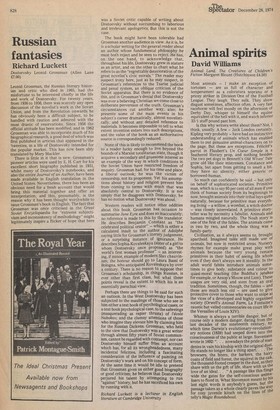Russian fantasies
Richard Luckett
Dostoevsky Leonid Grossman (Allen Lane £700)
Leonid Grossman, the Russian literary historian and critic who died in 1965, had the misfortune to be interested chiefly in the life and work of Dostoevsky. For twenty years, from 1936 to 1956, there was scarcely any open discussion of the novelist's work in the Soviet Union, and from the Revolution onwards he has obviously been a difficult subject, to be handled with caution and admired with the most drastic of reservations. Since 1956 the official attitude has been modified, and in 1962 Grossman was able to incorporate much of his biographical research, a good deal of which was first published in articles that appeared in the 'twenties, in a life of Dostoevsky intended for the popular market. This has now been ably translated by Mary Mackler.
There is little in it that is new. Grossman's pioneer articles were used by E. H. Can for his excellent short biography published in 1931, whilst many of Dostoevsky's notebooks, and also the entire _foam& of an Author, have been made available in English translation in the United States. Nevertheless, there has been an obvious need for a fresh account that would bring this material together and offer an interpretation, and this, presumably, is the reason why it has been thought worthwhile to issue Grossman's book in English. The fact that Grossman was once criticised in the Great Soviet Encyclopaedia for "extreme subjectivism and inconsistency of methodology" might legitimately inspire a flicker of hope that here
was a Soviet critic capable of writing about Dostoevsky without succumbing to laborious and irrelevant apologetics. But this is not the case.
The book might have been tolerable had Grossman another audience in view. As it is, he is a scholar writing for the general reader about an author whose fundamental philosophy he must both reject and be seen to reject. He has, on the one hand, to acknowledge that, throughout his life, Dostoevsky grew in stature as an artist, and on the other to chart what he refers to as the "regrettable deterioration of the great novelist's civic morals." The reader may suspect irony here, just as he may suspect, in Grossman's references to the Tsarist judicial and penal system, an oblique criticism of the Soviet apparatus. But there is no evidence of this, and in Grossman's denial that Dostoevsky was ever a believing Christian we come close to deliberate perversion of the truth. Grossman's circumstances cut another way, also; he presents some of the main events in his subject's career dramatically, almost n ovelistically, and without any detailed reference to materials. It becomes impossible to tell to what extent invention enters into such descriptions, and the value of the book as an authoritative source is correspondingly reduced.
None of this is likely to recommend the book to a reader lucky enough to live beyond the bounds of a Marxist totalitarian state, though it acquires a secondary and gruesome interest as an example of the way in which conditions in the Soviet Union have restricted freedom of enquiry. Grossman had, for his time and place, a liberal outlook; he was the victim of censorship, not its proponent. Yet his assumptions about history and religion prevent him from coming to terms with much that was absolutely central to Dostoevsky. It is not simply that he disagrees with Dostoevsky, he has no notion what Dostoevsky was about.
Western readers will notice other oddities about this book. Grossman has occasion to summarise Jane Eyre and does so inaccurately; no reference is made to this by the translator. He describes Benjamin Constant as "the celebrated political orator" — which is either a calculated insult to the author of Adolphe saying little for Grossman's literary judgement, or a surprising instance of ignorance. He describes Sophia Kovaleskaya (sister of a girl to whom Dostoevsky once proposed) as "the world's first woman professor" — an interesting, if minor, example of modern Slav chauvinism; the honour should go to Laura Bassi of Bologna, who anticipated Kovaleskaya by over a century. There is no reason to suppose that Grossman's scholarship, in things Russian, is ever other than first class, but what these points reveal is the extent to which his is an essentially parochial view.
Perhaps there are things to be said for such an outlook. In the West Dostoevsky has been subjected to the maulings of those who see in him either a text book Of psychological cases, or a text book psychological case, to the sabreings (masquerading as rapier thrusts) of l'dcole Nabokov, and the clumsy attentions of those who imagine they elevate him by claiming him for the Russian Dickens. Grossman, who held to the view that Dostoevsky was a great writer through almost fifty years of Soviet communism, cannot be regarded with contempt, nor can Dostoevsky himself suffer from an account which has, for all its wrongheadedness, many incidental felicities, including a fascinating consideration of the influence of painting on Dostoevsky's work and on his concept of form. At the same time it would be idle to pretend that Grossman gives us either good biography or good criticism; he believes that Dostoevsky perjured his talent by attempting to run "against" history, but he has sacrificed his own by running with it.
Richard Luckett is a lecturer in English literature at Cambridge University














































 Previous page
Previous page